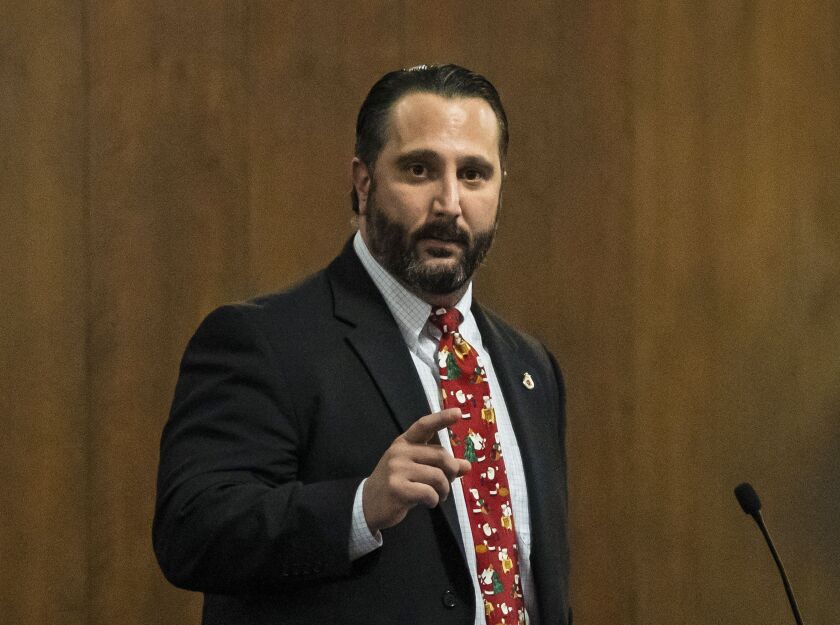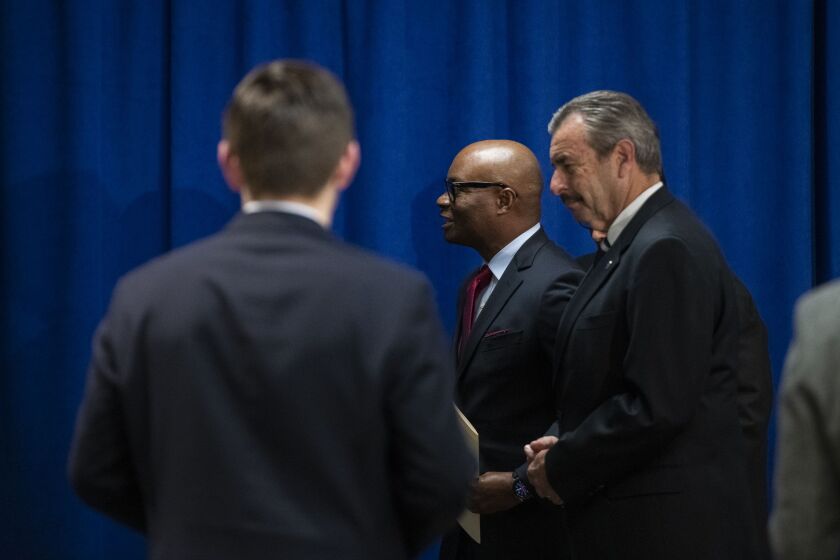The Chicago Police Department is losing officers in droves to the suburbs and other states, prompting a vow from police Supt. David Brown to reassign cops from specialized units to districts to stop the bleeding, according to one Chicago alderman.
“He said they can’t keep up with it. It’s an explosion — not his exact words — but it’s an explosion of lateral moves right now that’s adding to the retirements and the people that are just leaving the job. Leaving by just quitting being a police officer,” said Ald. Anthony Napolitano (41st), who’s served the city as both a police officer and firefighter.
“They also have a small number of officers that are finishing the academy, getting on the street and saying, ‘I don’t want to do this’ and leaving.”
On Dec. 1, the department had 11,913 officers — with 229 in the 16th District, according to the city inspector general’s office.
The department is more than 1,000 officers short of authorized strength — even after Mayor Lori Lightfoot balanced her 2021 budget by, in part, eliminating 614 police vacancies.
The apparent exodus to suburban and out-of-state police departments has exacerbated the staffing problem. So has a surge of coronavirus cases triggered by the Omicron variant that, at one point recently, left the 16th District with 72 officers out sick, Napolitano said.
In 2021, almost 900 officers left the department — 717 retired and 176 others either resigned or transferred to other police agencies, according to the latest available figures. Hundreds more officers plan to retire early this year, sources told the Sun-Times.
Last week, City Council members from the Northwest Side spoke with Brown to press their demand for additional officers in the 16th District, which covers 28.5 square miles.
The meeting was triggered by emergency dispatcher Keith Thornton Jr.’s warning that the district was dangerously understaffed.
According to Napolitano, Brown talked about the drains on police manpower and then made a promise of sorts.
“What we were told is they’re going to start sending everybody back from any of the specialized units throughout the city. They’re gonna be returned to their district or to all of the districts. The manpower is so low, they’re just gonna start sending them back from all the units back to their respective districts,” Napolitano said.
“It’s not a disbanding,” he said. “Some of them are gonna be shut down completely. Other units will still be open. As far as where they’re pulling from, I don’t know.”
Napolitano was not appeased by that promise — but he understand’s the superintendent’s dilemma.
“To me, it just kind of felt like the same conversation I’ve had about 10, 15 times prior. This time, I get it a little bit more because there’s nothing in the reserves to give right now. But at the same time, it doesn’t make our constituents happy,” the alderman said.
He added: “Not having a lot of coppers in 16 is terrible for us. But how large our footprint is hurts us as well because it’s based on response times and the availability to get a car across the [28.5 square mile] district to respond to emergency calls.”
A police spokesman responded to Napolitano’s comments, saying, “Patrol has always been the backbone of the Chicago Police Department and we are always looking to put more resources into patrol.”
The spokesman said the Chicago Police Department isn’t alone in seeing increased retirements and said the department has “ramped up recruitment initiatives” and created a new unit dedicated to recruitment and retention. There are currently about 7,250 applicants for the job, the spokesman said.
If Brown follows through, it will mark a dramatic retreat from policies Brown implemented after arriving from Dallas in April 2020.
Retired Los Angeles Police Chief Charlie Beck held down the fort after the drinking-and-driving incident that prompted Lightfoot to fire then-Supt. Eddie Johnson.
During Beck’s brief tenure in Chicago, he ordered one of the most sweeping reorganizations in CPD history, putting hundreds of officers and detectives back in neighborhood districts.
With homicides, shootings and civil unrest surging, Brown reversed field and created large units that can be mobilized across the city. That approach stripped neighborhood police districts of four to six officers per watch to prevent more looting in the summer of 2020.
On his one-year anniversary, Brown even told reporters his predecessor’s decentralized crime strategy “wasn’t working.”
Talking to the Sun-Times back then, Beck disputed that claim and criticized Brown’s decision to abandon Beck’s approach.
Beck explained the “community-oriented style” he embraced pushes resources “as close as possible” to the areas they serve to foster relationships between citizens and police and build “healthy neighborhoods” that “don’t need the police so much because they have standards.”
He said Brown’s reconfiguration was “a more militaristic, shock-and-awe style of policing” with centralized resources deployed to hot spots. Ironically, that form of policing originated in Los Angeles in the 1960’s. Beck said Brown copied that “metropolitan division” during his tenure in Dallas and has copied it again in Chicago.
“It has a major drawback. That is, it tends to alienate the community that’s involved. You just cannot saturate neighborhoods with police and expect that to be a long-term strategy. It’ll work in the short-term. But it can’t be your go-to. It has to be something for emergencies,” Beck said.
In a phone call with Brown to clear the air, Beck said he “recommended that he go back to a community-based strategy as soon as he could. And he agreed with that.”
Contributing: Frank Main







